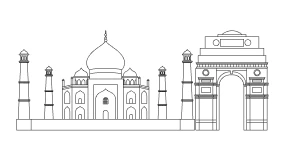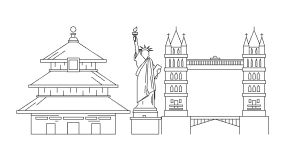Did you know that booking a flight used to mean flipping through thick paper timetables and waiting on hold just to catch a seat? Fast forward to today, and the Global Distribution System (GDS) has completely transformed the travel scene.
These digital powerhouses quietly work behind the scenes, connecting airlines, hotels, car rentals, and travel agents in real time. With just a few clicks, travelers and agents can now book everything from flights to hotels and even cruises, without endless phone calls or scattered bookings. It’s all about speed, convenience, and having the world of travel at your fingertips.
But GDS isn’t just about making bookings easier, it’s a game-changer for the travel business too. This expanded market reach is one of the key benefits of GDS, helping businesses grow beyond their local borders and compete on a global stage. Whether you are a travel pro or just love to explore, understanding different types of GDS and how they shape your travel experience opens up a whole new world of possibilities.
Types of Global Distribution Systems (GDS)
The world of Global Distribution Systems isn’t just about connecting travel agents and suppliers, but also about how these connections happen. Whether you’re a hotelier, travel agent, or tech enthusiast, understanding these types is essential for making the most of today’s travel software development and maximizing your reach in the global marketplace.
Let’s break down the four main types of GDS models, explore their unique features, and see how they play out in real-world travel scenarios.

Retail Model
The retail model is the classic approach where travel agents act as intermediaries, selling rooms, flights or packages directly to customers at published rates. Agents earn a commission for each booking, making this model a staple for brick-and-mortar agencies and traditional travel businesses.
The retail model is the traditional method where travel agents directly sell flights, hotels, or packages to customers, earning commission on each booking.
Features
- Travel agents access real-time inventory via GDS.
- Agents earn commissions on bookings.
- Personalized service for complex itineraries.
- Transparent pricing is visible to customers.
For instance, a family planning a multi-city vacation visits a local travel agency. The agents use Amadeus to check availability and prices instantly, then book flights and hotels tailored to the family’s preferences. The agent earns a commission, and the family benefits from the expert’s advice and bundled services. This model thrives on human interactions and trust, which remains vital despite digital advances.
Merchant Model
In the merchant model, online travel agencies (OTAs) like Expedia purchase inventory from hotels or airlines at a discounted rate and then resell it to customers at a markup. This means OTA controls the price and handles customer payments, while the supplier gets paid after the booking is fulfilled.
In the merchant model, OTAs purchase inventory at discounted rates and resell it to customers, controlling pricing and payment.
Features
- OTAs buy inventory upfront from suppliers.
- OTAs set retail prices and handle payments.
- Suppliers receive payment after service delivery.
- Enables flash sales and bulk sales.
When booking a last-minute hotel deal on Expedia, the OTA has already secured rooms at a lower price from the hotel. They resell these rooms at a marked-up rate, offering customers attractive discounts while managing the transaction flow. This model is common in travel CRM and requires sophisticated travel software to manage inventory and pricing dynamically.
Opaque Model
The Opaque model adds an element of surprise: customers book without knowing the exact brand or property until after the purchase is complete. Sites like Priceline pioneered this approach, letting travelers bid on hotel rooms or flights based on price and general location, but not the specific provider.
The opaque model offers discounted travel products without revealing the exact brand or property until after purchase.
Features
- Customers bid or select based on price and general location.
- Actual provider details revealed post-booking.
- Help suppliers sell unsold inventory discreetly.
- Offers deep discounts to price-sensitive travelers.
Priceline’s “Name Your Price” feature lets travelers bid on hotel rooms. A traveler might pay a fraction of the usual rate for a luxury hotel, but only learns the hotel’s name after booking. This model benefits hotels by protecting brand value while filling rooms that would otherwise remain empty.
NDC (New Distribution Capability)
NDC is a modern standard developed by IATA that enables airlines to offer richer, more personalized content directly to travel sellers, bypassing some of the limitations of traditional GDS. With NDC, airlines can showcase tailored offers, bundled services, and ancillary services products think seat upgrades, baggage, or lounge access in real time.
NDC is an IATA-developed standard that enables airlines to distribute personalized, rich content directly to travel sellers, enhancing the booking experience.
Features
- XML-based data exchange standard.
- Real-time access to personalized offers and ancillary services.
- Supports dynamic pricing and bundled products.
- Improves transparency and customer experience.
A frequent flyer booking through a travel agency’s platform might see exclusive upgrade options and baggage bundles tailored to their loyalty status, thanks to NDC integrations. Airlines and travel technology solutions leverage NDC to create more flexible and customer-centric booking tools, revolutionizing how air travel is retailed.
The above breakdown shows how each GDS type serves different roles in the travel ecosystem, with travel app development playing a key role in enabling seamless integrations and enhanced user experiences.
How Guru TechnoLabs Supports GDS Integration
As technology continues to reshape the travel industry, GDS integration has truly revolutionized how businesses connect with travelers and suppliers globally. At Guru TechnoLabs, we make this transformation simple by integrating leading GDS platforms like Amadeus, Sabre, and TravelPort directly into your booking system, so you can focus on growing your business while we handle the technical complexity.
Our team brings deep expertise in travel technology solution development, ensuring your platform is robust, scalable, and ready to meet the demands of modern travelers. Ready to take your travel business to the next horizon? Connect with us today and let’s build something special together.
















